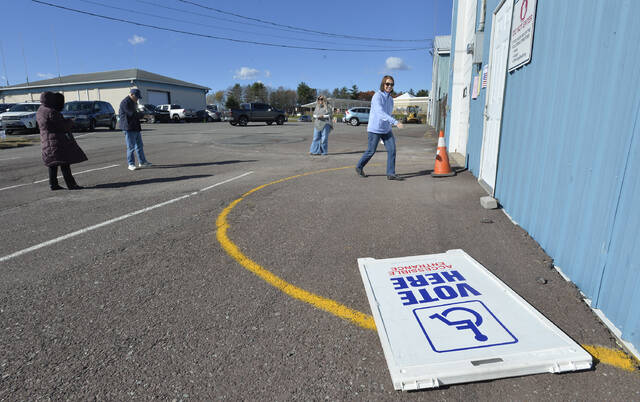
A lone voter arrives to vote in Dallas Twp. on a windy day that toppled the ‘vote here’ sign.
Mark Moran | For Times Leader
A majority of Luzerne County voters rejected a proposed switch to a new county home rule charter, according to unofficial election results.
With all 186 voting precincts reporting, the tally was 26,512 for the revised charter and 41,114 in support of keeping the existing structure in effect since January 2012, the results said.
An elected, seven-citizen Government Study Commission drafted the proposed new charter.
Advocates had described the proposed new charter as more efficient and modern. Opponents asserted it would weaken safeguards and put elections at risk with the potential for county Election Board modifications.
Study Commission Chairman Ted Ritsick said Tuesday night the proposed charter was an opportunity to make alterations in one package.
When a proposed charter is defeated, a new government study commission cannot be elected within five years, according to the state’s home rule handbook.
That leaves referendums on specific, limited alterations as the only option if changes are warranted in coming years, Ritsick said.
“Our voters have chosen to keep the current charter and will now need to rely on a series of individual ballot questions for change,” Ritsick said.
Ballot amendments are not an “easy or efficient process,” he added.
“It is my hope the document our commission drafted will be able to guide Luzerne County to the solutions that it needs,” Ritsick said. “Using the ballot question process, it will now be up to County Council to confront these challenges directly, campaign for approval, and demonstrate the leadership our residents deserve.”
The new charter would have reduced council — the part-time governing legislative body — from 11 to nine members at the start of 2028.
Supporters had argued the cut of two would make the nine remaining council members more accountable and efficient. Critics said the reduction would lead to less scrutiny of county matters and diminish voter representation.
Regarding the county Election Board, it would have initially remained the same, with five volunteer citizens. However, after 23 months, the structure could have been changed to allow employees and/or council members to serve on the board if a council majority-plus-one determined such an alteration was warranted.
A commission majority had concluded council must have flexibility to change from an all citizen board if the board’s powers must increase to comply with state election law, which could include authority to hire the election director, choose the voting system and prepare annual election budgets. Concerns were raised about providing such complete control over elections to five unelected people — potentially to a majority of three members from the same political party.
In another change impacted elected officials, the three-term limit in the current charter would have been kept, but elected or appointed terms of two years or less would not have been counted toward the limit in the proposed charter.
The proposal also provided a clean slate to the DA and controller by not counting terms prior to the new charter’s effective date toward the three-term limit.
The greatest impact of both changes would have been on county District Attorney Sam Sanguedolce.
Instead of 12 years — three full, four-year terms — Sanguedolce is limited to less than seven years in the current charter because it counts two prior partial terms, one appointed and the other elected, toward the total. Sanguedolce was elected to his first full, four-year term in November 2023.
With the proposed clean slate provision, Sanguedolce’s current four-year term would not have counted toward the limit. He would have been eligible to serve three more four-year terms.
Reach Jennifer Learn-Andes at 570-991-6388 or on Twitter @TLJenLearnAndes.



